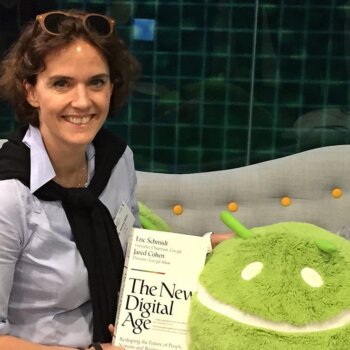In the spring of 2013, Nobel prize-winning physicist James Cronin was awarded the Alumni Medal for lifetime achievement as a professor at the University of Chicago, where I went to college. In his remarks, Mr. Cronin stated that his greatest concern about the future of America was our emphasis on science and technology education. He was not concerned with too much science education as much as too little education in the other areas of life. He said much of his breakthrough thinking came from his discussions with the social scientists and humanities faculty at the University, not from hanging around only with physicists and other scientists.
I live in Austin, Texas, a leading center for technology startups, especially software and online companies. I travel the world talking (excitedly) to people about entrepreneurship and innovation; technology is often at the heart of our discussions. I love gadgets and am enthusiastic about many of the technologies that have emerged in the last 50 years. For example, the book Abundance by technology enthusiasts Peter Diamandis and Steven Kotler is a favorite of mine. I believe that “big data” understood by the right minds will have great benefits to society.
At the same time, I share Cronin’s fear that our obsessive focus on “hard” science and technology has swung too far, resulting in an under-emphasis on understanding the other aspects of life and society. It will cost society greatly if we do not have a more holistic and integrated approach to what we consider important and to our educational priorities. What do our future leaders need to learn?
This emphasis on left-brain, analytical, and quantified thinking is both global and pervasive. In some parts of booming Asia, the bright kids get into engineering school and the ones with lower test scores study the liberal arts: history, the humanities, the social sciences. Our whole system seems to march toward formulas, science, and technology.
Over the last 50 years, most American business schools have moved towards finance, information technology, quantification, and formulaic/algorithmic thinking. But leaders in the “real” world spend more time and energy on human motivation and organization – psychology and sociology – than on any other field. Among the most important required talents are communications skills – the ability to speak and write clearly.
I often see business and engineering students looking for ideas and solutions solely through ROI (Return on Investment) analysis rather than through thinking about humans, why people do what they do, and how we as entrepreneurs can meet their real needs and solve their real problems.
At many business schools, there is little support for entrepreneurial ventures which are not considered tech companies, or not fundable by venture capitalists, who also tend to emphasize tech. Most startups, including many of the great enterprises of the future, are neither tech nor suitable for venture capital financing. In this process, are the importance of psychology, sociology, biology, art and design, language, history, and others getting left out?
Experience indicates that a more balanced approach is critical to great success, even in technology companies and industries. The rise of the computer in the early 1950s is telling. Philadelphia’s Univac had pioneered the commercial mainframe computer, but the other leading office machine and tech companies of the era also saw the vast opportunity. Distantly behind Univac were such names as IBM, GE, Westinghouse, RCA, Burroughs, and NCR (National Cash Register).
Most of these companies were focused on the science, aiming to design computers with faster brains (CPUs). But IBM leader Thomas Watson, Sr., instead asked his customers what they wanted, and none thought they needed a faster CPU. They needed a faster printer in order to get the information out of the mainframe. So he went back to his labs, and they invented the high speed printer.
Within two years IBM achieved a market share above 60%, and held that astounding position (or better) globally for the next 30-plus years, creating one of the greatest and most profitable enterprises in US history (prior to its near-death in the early 90s and subsequent rebirth). Watson (and his son and successor Thomas, Jr.) understood that selling technology was all about people: about understanding customers and their needs. New IBM mainframe computers were introduced with secrecy followed by great fanfare and visually designed at a much higher level than their competitors – even their office architecture and logo reflected high design standards.
Fast forward 40 years and we saw Steve Jobs following a similar pattern. Last year the iPhone alone generated more revenue than the whole of Procter & Gamble. I don’t think that remarkable achievement was due primarily to better science or more advanced algorithms. It was due to making things that are easy to use and understanding what it is like to be a user, coupled with outstanding product design. All with showmanship and marketing pizzazz – pages right out of the Watsons’ IBM playbook. It has been said that the greatness of Steve Jobs was that he had the heart of an artist and the mind of an engineer. We need both. We also need innovation in our society and culture.
One ranking of the greatest business people of all time placed David Sarnoff high on the list and William Paley much lower. Sarnoff is rightfully ranked high because he was the primary promoter of commercial radio in the US (through his RCA and NBC companies) and the technological leader of broadcasting’s evolution into television, followed by color television. Bill Paley on the other hand built CBS, and gave us “cultural” innovations like the nightly TV news, the soap opera, the situation comedy, and the television star. Because we sometimes tend to think of innovation as tech-only, Paley is not ranked as highly as Sarnoff. But his innovations will probably long outlast those of Sarnoff, which will over time be superseded by new technologies.
Both were great men, but our perspective is out of balance. I have given talks on the histories of the movie, airline, auto, retailing, computer, and some of the media industries. Reviewing all the great products, ideas, and buildings they created, I realized that the things most likely to still be of value and of use in 200 years are the movies and other “cultural products.” The magazine, the fast food restaurant, and the discount store are important innovations right alongside the latest tech breakthrough. Their impact on us and our society can be immense.
These observations lead me to thinking more broadly about the role of science and technology, and beyond that to our emphasis on left-brain, logical, analytical thinking. I serve as Entrepreneur-in-Residence at the University of Texas School of Information, which is the modern evolution of the school of library and information sciences. We focus, like librarians and card catalogs, on the role of humans in information – how data is used and understood. We go beyond algorithms and machine learning to focus on human psychology and behavior. This is a very different mindset from that of most computer scientists and even business students.
Peter Drucker in a 2001 magazine interview said, “I can say that no financial man will ever understand business because financial people think a business makes money. A company makes shoes, and no financial man understands that.” In the book Poor Charlie’s Almanac by Charlie Munger, Warren Buffet’s brilliant investment partner, psychology is referenced 140 times in the index; return on investment none.
I have come to believe that this left-brained focus has also limited our thinking about health and longevity. Many of my friends seem to think health is determined entirely or overwhelmingly by diet and exercise. But eating and exercising are complex parts of human society. I think that our health and longevity are in large part determined by our social and cultural environment, the friends and loved ones we are with, when and where and how old we are, and most importantly our own mental attitude.
The physicist Cronin and I are not alone in these concerns. Daniel Pink wrote an excellent book called A Whole New Mind about the importance of balanced education and thinking. The great entrepreneur Nolan Bushnell touches on many similar ideas in his intriguing book, Finding the Next Steve Jobs. Perhaps a better grounding in the liberal arts, from design to history, from music to philosophy, from economics to social psychology, would serve all of us better.
written by Gary Hoover of Texas Enterprise. see more.





























